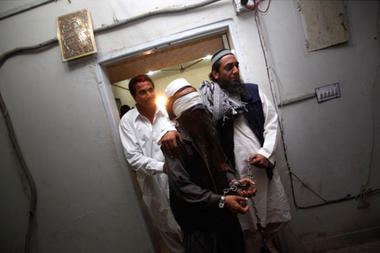Half of Quetta Shura Arrested
BY Herschel SmithPakistan has supported a robust U.S. drone campaign against the Pakistan Taliban, or Tehrik-i-Taliban, because they see them at least somewhat as an existential threat. The Afghan Taliban led by Mullah Omar is a different story. The leadership is primarily in Pakistan, at first in Quetta and eventually scattered as necessary to avoid detection. There has been no drone campaign against them because the Pakistani leadership and Army has a quaint but wrongheaded notion of using them (throughout Afghanistan and Kashmir) as a counterbalance against what they view as Indian hegemony. That is, until recently.
Their top military commander, Mullah Abdul Ghani Baradar, was recently captured in the port city of Karachi. There is a bit of intrigue surrounding his capture, including the highly plausible hypothesis that Pakistan wants a place at the bargaining table if and when the Taliban ask for negotiations. Whatever the reason(s), they are still salient, as half of the Quetta Shura has now been arrested in Pakistan.
Plain clothed police move a Pakistan Taliban commander from the Bajaur region through the halls of the Police Crime Investigation Department on Feb. 17. Akhtar Soomro/Reuters
Pakistan has arrested nearly half of the Afghanistan Taliban’s leadership in recent days, Pakistani officials told the Monitor Wednesday, dealing what could be a crucial blow to the insurgent movement.
In total, seven of the insurgent group’s 15-member leadership council, thought to be based in Quetta, Pakistan, including the head of military operations, have been apprehended in the past week, according to Pakistani intelligence officials.
Western and Pakistani media had previously reported the arrest of three of the 15, but this is the first confirmation of the wider scale of the Pakistan crackdown on the Taliban leadership, something the US has sought.
“This really hurts the Taliban in the short run,” says Wahid Muzjda, a former Taliban official turned political analyst, based in Kabul. Whether it will have an effect in the long run will depend on what kind of new leaders take the reins, he says.
News of the sweep emerged over the past week, with reports that Pakistani authorities had netted Mullah Abdul Ghani Baradar, the movement’s second in command, as well as Maulavi Abdul Kabir, a prominent commander in charge of insurgent operations in eastern Afghanistan, and Mullah Muhammad Younis.
Pakistan has also captured several other Afghan members of the leadership council, called the Quetta Shura, two officials with the Pakistani Intelligence Bureau, and a United Nations official in Kabul told the Monitor.
These include: Mullah Abdul Qayoum Zakir, who oversees the movement’s military affairs, Mullah Muhammad Hassan, Mullah Ahmed Jan Akhunzada, and Mullah Abdul Raouf.
At least two Taliban shadow provincial governors, who are part of the movement’s parallel government in Afghanistan, have also been captured.
A Taliban spokesman denied the arrests, saying that they were meant to hide the difficulties that United States and NATO forces were having in Afghanistan.
Our favorite Taliban propagandist working for the Asia Times, Syed Saleem Shahzad, tells us that the importance of these high value target (HVT) hits may be exaggerated.
Taliban sources tell Asia Times Online on the condition of anonymity that the appointment will be largely symbolic and primarily for coordination purposes as Taliban leader Mullah Omar, following difficulties in recent years, has decentralized the Taliban’s command structure. The idea is to give commanders in the field greater flexibility and allow for the possibility that should even Mullah Omar be seized or killed, the resistance would continue to function …
“Mansoor’s appointment is very likely, but so far there has been no confirmed decision,” a mid-ranking Taliban official told Asia Times Online. “However, the position of supreme commander is now ceremonial and for the purposes of coordination. In the new setup, military operations have been completely decentralized and are in the hands of local commanders who have been given broad policies. It is up to them to sort out their own tactics,” the Talib said.
“For this reason, Mullah Baradar’s arrest did not have much effect on military operations, including at Marjah [the ongoing major offensive against the Taliban in Helmand province] where the Taliban continue to provide tough resistance to the occupation forces. And whoever is appointed [supreme commander], it won’t make much difference on military operations.”
We’ll see how much operations are affected. The Taliban have a HVT campaign of their own, so switching sides is problematic. I have been on the forefront with denials that the HVT campaign is useful enough to justify its effort and expense. But neither should we deny the usefulness of taking out half of the Taliban Shura.
Either way, it won’t end the insurgency in Afghanistan or Pakistan, and it certainly will not end the globalist intentions of the Tehrik-i-Taliban. Since different brands of the Taliban swim in the same waters and cross pollinate ideas, something so simple as a HVT campaign won’t end the war in spite of its usefulness.






On February 25, 2010 at 10:19 pm, Warbucks said:
Victor Davis Hanson writes a worthwhile column posted Feb 19th on taking out the enemy:
The Tragic Truth of War
What we dare not say: Killing the enemy brings victory
http://www.victorhanson.com/articles/hanson021910.html